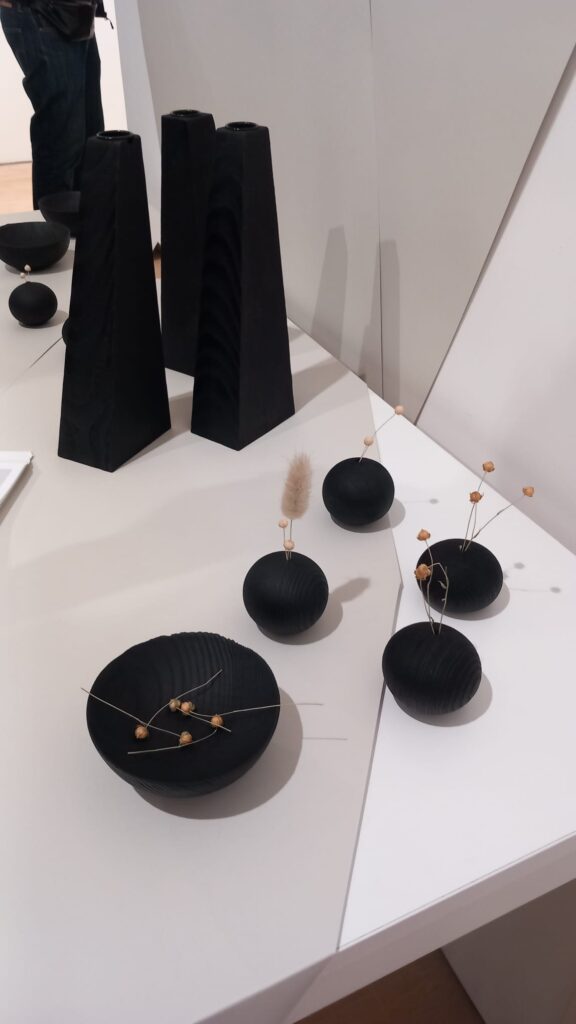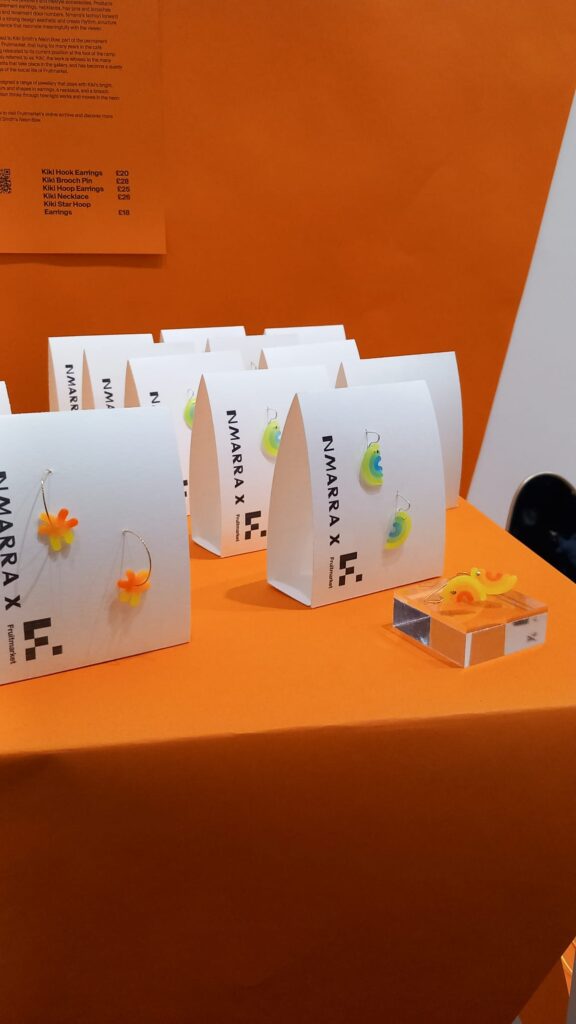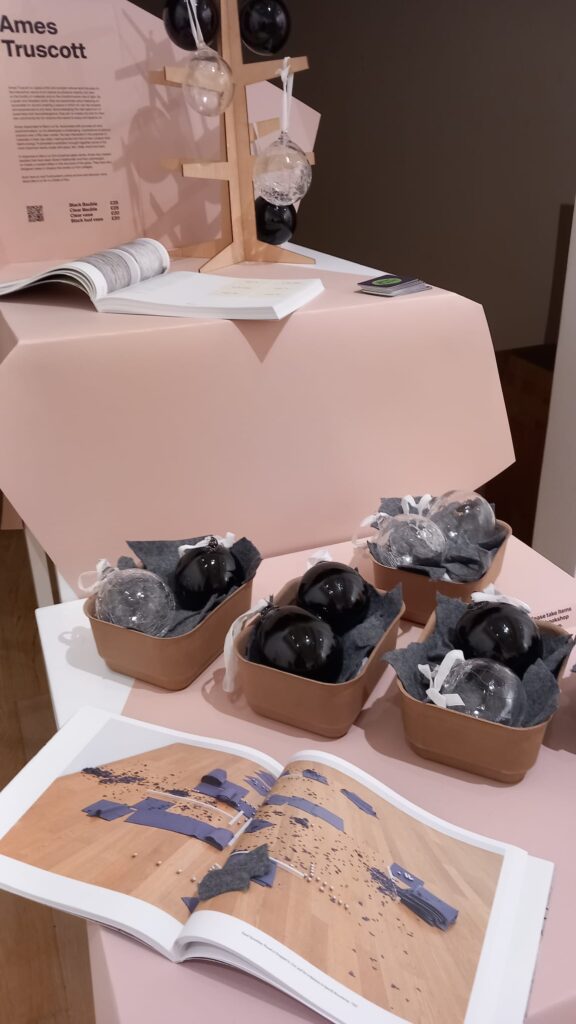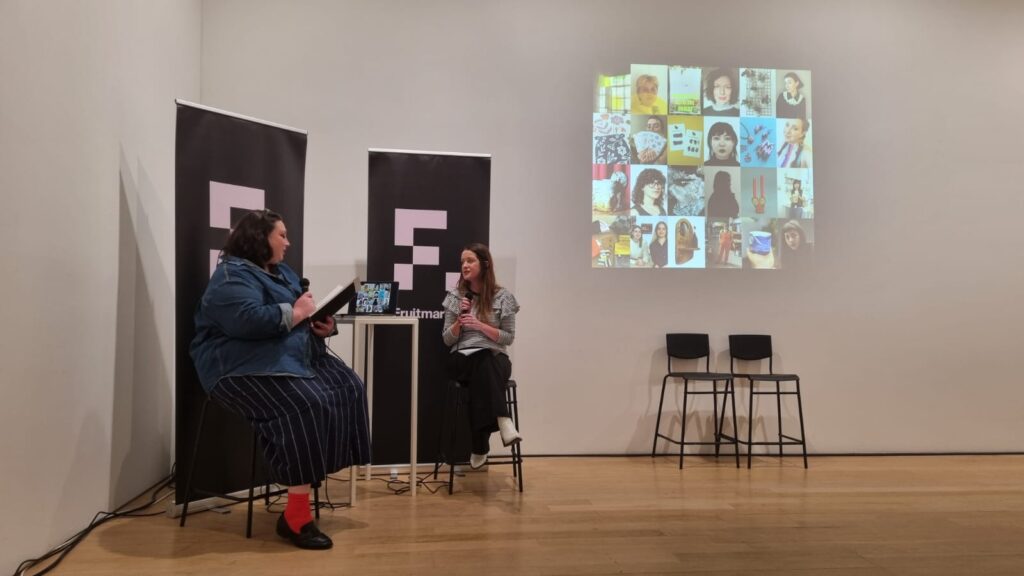A year on from being awarded the inaugural Seeds of Change prize fund, Edinburgh gallery Fruitmarket is far from closing the chapter on its Future Makers programme. Instead, the gallery opened its doors and its shop floor to celebrate a full year of creativity, experimentation, and local collaboration.
Cultural Enterprises Creative Development Manager Fi Anderson joined the team at Fruitmarket for this very special weekend showcase, and shares some of the highlights.

To mark the anniversary of its innovative Future Makers programme, Fruitmarket transformed the gallery space behind the shop and café into a curated, shoppable exhibition showcasing the work of participating makers. The event blurred the lines between gallery and retail, art and object, placing local makers quite literally at the centre of the space. Visitors were invited not only to look but to engage, purchase, and connect directly with the creative process.
During the opening preview, the atmosphere buzzed with conversation and discovery. We were pleased to meet the makers and hear first-hand how the programme had shaped their practice. One recurring theme was the sense of challenge and growth that came from creating within new frameworks. As one maker reflected, stepping into production and multiples pushed their craft into new territory, completely undoing the practice that, as an artist, they had been taught to do. To create one thing and then move on. In contrast, one of the other makers who has developed a growing wholesale business appreciated the challenge that stopping and rethinking her craft and design allowed her. To develop something in collaboration with someone else and step out of tried and proven design.
Overwhelmingly, despite the challenges, the makers all appreciated the design direction, idea sharing and wholesale knowledge that they received. Often as independent makers, working can be a solitary experience. By taking part in the Future Makers programme, they had someone to bounce ideas off and this often helped to boost confidence.
As the driving force behind Future Makers, Fruitmarket’s Buying & Retail Manager, Allison Everett was strong on her outlook that she wanted this programme to be a success and bring some fresh energy into the shop. She also wanted it to open the doors and to demystify wholesale, posing the question that art schools should be doing more to support their students to understand the business world, not just the artists’ world.

Rethinking the Gallery Shop
The Future Makers initiative challenged familiar ideas about what a gallery shop can be. We’re used to leaving an exhibition with a beautifully designed keepsake, a catalogue, a postcard, or perhaps a design translated onto an umbrella, magnet, or mug inspired by the artwork, offering visitors a way to take home an echo of the experience.
This project turned that model on its head. Instead of reproducing artworks, makers were invited to create unique, craft-led pieces in direct dialogue with the exhibiting artist and their work. Initially, there were understandable concerns that such a close relationship between product and artwork might detract from the artist’s voice. Yet as the shelves began to fill and the vision came to life, the strength of the idea became clear.
Fruitmarket’s long-held motto “to put the artist at the centre of everything we do” found a new interpretation here: placing the maker at the centre of the shop. Over the past year, these makers’ works have quietly found their way into the gallery’s retail space, appearing one by one in response to each exhibition. Bringing them together for the first time revealed not only the variety and diversity of design approaches but also the care and thought that underpin this programme. The result is a reimagined model of cultural retail, collaborative, evolving, and deeply rooted in local creative practice.



Insights and Takeaways
The preview weekend also featured a full day dedicated to conversation and reflection. To open the programme, I teamed up with Allison to chair a discussion exploring the inspiration behind Future Makers, the lessons learned along the way, and how the project might evolve in the future.
The final session brought together Dr Stacey Hunter, a passionate advocate for craft and local design, fresh from curating the acclaimed Harvest exhibition for Craft Scotland at City Art Centre, and Kate Grenyer, Director of Fife Contemporary. Their conversation, The Future of Craft in Scotland, struck a hopeful note. Both highlighted the growing international recognition of Scottish makers and the increasing emphasis on sustainable materials and methods. From Susie Redman’s home-grown flax textiles to the rising trend of recycling metals and repurposing pre-loved objects, they reflected on how economic pressures, such as the soaring cost of gold are inspiring makers to innovate through necessity and conscience alike.
The day continued with a lively panel where three of the participating makers joined Allison on stage to share their experiences. Each spoke warmly about her guidance and about how the process encouraged them to step outside their comfort zones. To experiment, to rethink their practice, and to approach making from a new perspective and with price points and packaging intrinsically woven into that process.
They also posed a compelling challenge to the sector: what if museum and gallery shops committed to sourcing 30–40% of their stock from local makers? It’s a question that invites us all to imagine a future where craft, sustainability, and cultural enterprise are even more closely intertwined.

Looking Forward
As Future Makers moves into its next phase, Fruitmarket plans to publish materials supporting others interested in launching similar programmes from galleries seeking to showcase local makers to retail teams exploring new ways to merge creativity and commerce. These materials will also be shared with our membership, so you can adopt your own version and help new local makers to flourish within your gallery or museum shop.
This preview weekend proved more than a celebration of objects; it was a testament to process, partnership, and possibility. The seeds sown a year ago have flourished into a model of collaboration that challenges and inspires the cultural sector, a reminder that the future of making is both local and shared.
The 2025 Seeds of Change prize fund has been awarded to The Art House in Wakefield – look out for updates on how their project develops over the coming months. Meanwhile, read more about Seeds of Change.
